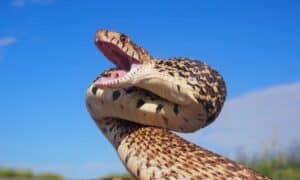Introduction
When it involves venomous snakes, Australia is home to several of the most fascinating and harmful types in the world. Amongst these, the Tiger Snake sticks out not only for its powerful poison however also for its intriguing actions. Understanding the actions of poisonous serpents like the Tiger Serpent is critical for both wild animals enthusiasts and those residing in areas where these snakes exist. This article delves into various elements of Tiger Serpent habits, habitat, identification, safety measures, and first aid practices in instance of a serpent bite.
Understanding the Behavior of Venomous Snakes Like the Tiger Snake
The Tiger Snake, clinically called Notechis scutatus, is notorious for its hostile nature when intimidated. These serpents display a range of habits that can be fairly different from their non-venomous equivalents.
Characteristics of Tiger Snakes
The Tiger Snake is quickly identifiable because of its distinct bands or red stripes that resemble a tiger's markings. They can differ in color from yellowish-brown to dark olive or black. This pigmentation serves not just as camouflage but also as a warning signal to prospective predators.
Adaptability to Environment
One remarkable facet of their actions is their versatility to various settings. Located mainly in coastal regions, marshes, and wetlands throughout Australia and Tasmania, they can flourish in varied habitats including metropolitan areas.

Hunting Techniques
Tiger Snakes are ambush killers mainly feeding on fish, frogs, and little creatures. They possess eager eyesight and a severe sense http://archerujtb886.raidersfanteamshop.com/a-newbie-s-overview-to-australian-snakes-concentrate-on-tiger-snakes-1 of smell which helps them in situating prey effectively.
Venom Composition
Their venom includes neurotoxins that impact the nerves, bring about paralysis or death in smaller animals. For humans, prompt medical interest is critical after a tiger snake bite because of its potentially lethal effects.

Natural Habitat of Tiger Snakes
Preferred Locations
Understanding where these serpents stay clarify their behavioral patterns. The tiger serpent habitat consists of:
- Coastal regions Swamps Grasslands Urban areas with bountiful water sources
Seasonal Movements
During warmer months, Tiger Snakes are more energetic as they indulge in sunlight or hunt for food. In contrast, cooler months see them retreating right into hibernation sites.
Are Tiger Snakes Venomous?
Yes! The question "are tiger serpents poisonous?" typically develops amongst those not familiar with this varieties. Their poison is taken into consideration among the most dangerous amongst all serpent species worldwide.
Symptoms of a Tiger Serpent Bite
If bitten by a tiger serpent, signs and symptoms might consist of:

- Localized pain Swelling at the bite site Nausea and vomiting Sweating and confusion
Immediate clinical assistance is important as without treatment bites can cause extreme health issues and even death.
read moreFirst Aid for Serpent Bites: Quick Reaction Guide
Knowing exactly how to provide emergency treatment for a serpent bite could save somebody's life. Here's what you must do:
Step 1: Remain Calm
Keeping tranquility aids reduce heart price which decreases venom spread.
Step 2: Immobilize the Impacted Area
Keep the influenced arm or leg still and listed below heart degree if possible.
Step 3: Call Emergency Situation Services
Always seek expert clinical help instantly after a serpent bite.
First Aid for Serpent Bite Package Essentials
A well-equipped snake bite emergency treatment kit must consist of:
- A compression bandage Antiseptic wipes A pair of scissors An ice bag
Safety Safety measures: Avoiding Snake Bites in Australia
Awareness Programs
Educating areas concerning local serpent species and their behaviors can considerably decrease experiences resulting in bites.
Avoiding Harmful Areas
Staying away from lengthy yard throughout warmer months decreases contact with serpents that might be relaxing or hunting.
Common Mistaken beliefs Regarding Tiger Snakes
Many individuals think mistaken beliefs about the habits of tiger serpents cause unneeded concern. Here are some explanations:
Myth 1: All Tigers Are Aggressive
Not all tiger snakes will show hostility if left undisturbed; numerous favor running away as opposed to confrontation.
Myth 2: They Chase Humans
Tiger serpents do not actively chase after humans; they might strike when they feel threatened however will normally pull back if offered space.
Conservation Efforts Associated with Venomous Snakes
Conservation initiatives focus on educating Venomous snake areas concerning safeguarding local wild animals while minimizing human-snake interactions.
Importance of Ecosystems
Understanding that venomous snakes play a necessary duty in keeping environmental equilibrium helps foster gratitude rather than concern towards them.
FAQs Concerning Tiger Snakes
What ought to I do if I run into a tiger snake?- Maintain distance and slowly back away without abrupt movements.
- While bites aren't very usual due to awareness efforts, they still occur each year within Australia.
- Baby tiger snakes can supply full doses of venom despite being smaller sized; for this reason caution is advised around them.
- They mainly take in frogs, fish, tiny animals like rodents, and various other reptiles.
- It's prohibited in a lot of jurisdictions without appropriate licensing due to security worries regarding their venom.
- Wear sturdy boots and remain on significant trails; appearance prior to positioning hands or feet into concealed rooms like rocks or logs.
Conclusion
Understanding the actions of venomous snakes like the Tiger Serpent not only improves our understanding but additionally advertises security recognition amongst those living near their habitats. From identifying their qualities, understanding emergency treatment protocols adhering to a bite, through engaging conservation efforts-- every facet plays a vital function in promoting conjunction with these remarkable reptiles while respecting their location within our ecosystem.
As we strengthen our understanding through education and learning and experience, we add favorably toward guaranteeing both human security and wild animals preservation-- profiting all celebrations involved!